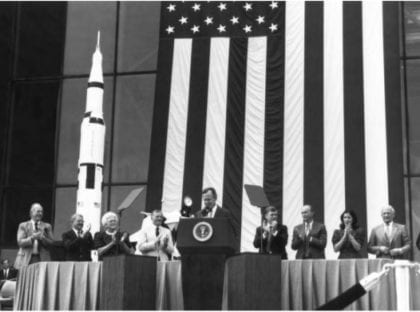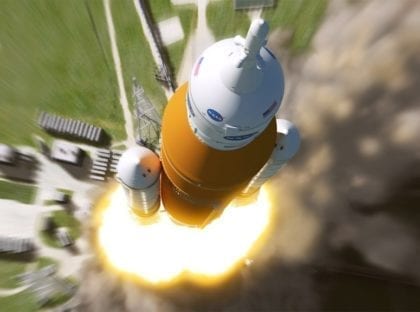In other words, we created a new creative society that has added tremendously to human civilization as a whole. We don’t terraform Mars in order to abandon the Earth. We terraform Mars to have an additional Earth.
What is the goal of the Mars Society?
To further the exploration and settlement of Mars by both public and private means. That means supporting both robotic exploration and human exploration. And it mean supporting base building, settlement, the development of technologies that enable settlement and ultimately terraforming. It also includes supporting the development of launch technologies, transportation systems that allow us to get to Mars, power systems for use on Mars.
What do you say to those who think we should settle the moon first?
I disagree with that argument, but I can respect it. I can respect the people who say, “We should go to the moon, it’s closer, we know how to do it, and there’s a water ice near the lunar south pole which we could make use of to help us explore the moon.” If you did do that, it would certainly restore a sense of confidence and accomplishment to the human spaceflight program.
But the Trump administration isn’t doing that. If you’re saying that you need to go to the moon before you go to Mars, then go to the moon. Instead, they come up with this ridiculous idea that before they go to the moon they will put a space station in orbit around the moon. You do not need a space station in orbit around the moon to go to the moon. You do not need a space station around the moon to go to Mars.
If you build such a station, the bureaucracy would unquestionably impose a requirement on all lunar missions that they go there on the way to the moon because otherwise it would look ridiculous that you built this space station that you never actually use. That will make moon missions harder to do because it’s easier to go straight to the moon. It’s like somebody saying: Let’s build an airport in Sherbrooke, Canada, and anyone leaving New York City has to stop there on their way to London. And sure, you could do that on your way to London but it’s not helping you get to London. To say nothing of all the money you’re wasting on this airport in an out-of-the-way place.
The Apollo program generated tremendous excitement and fostered a sense of national unity. Could a mission to Mars do the same?
When I was growing up, the government was able to do great things. My parents, my uncles, they all participated in World War II. While I was a kid, we were building an interstate highway system, and as a teenager, we were going to the moon. You had a political class that was united around such purposes. Since then it has severely degenerated. There’s a real problem here. It goes way beyond the problems of the space program in terms of fixing the American political class.
We could not build the interstate highway system today. Different factions would sabotage each other and prevent things from getting done. So it’s going to take some real statecraft to put Humpty Dumpty back together again, in the terms of the U.S. government’s capacity to undertake great projects. Of course, part of the reason why the American political class, in the period from the ‘40s to the ‘60s, was able to do great things was because they had been forged in the furnace of war. People understood how to get things done and how to work together. And while some of the people who did Apollo understood it as a step to human expansion to space, for much of the political class it was to win the Cold War.
Perhaps we need that sort of challenge. Maybe if we’re challenged by the Chinese or the Russians, or someone takes it seriously and they rally the nation that we are going to continue to be the vanguard of humanity, and we’re going to celebrate our good deeds in newspapers and not in museums, maybe they can rally the nation.
What role should commercial spaceflight companies play?
Starting in the ‘90s you started to see private ventures, billionaires saying, “I’m going to open space this year, I’m going to start a rocket company.” There were several that were started that all failed during the ‘90s until [SpaceX CEO Elon] Musk came along and succeeded. Since I am well acquainted with those previous efforts as well as Musk, I can tell you why he succeeded and why they didn’t. He didn’t just throw some money at the problem and quit as soon as it got tough. He put not only his fortune but his heart, mind and his soul into it. He learned rocketry himself, and he didn’t give up when his first three launches failed.
Fortune favors the brave, fortune favors the tough and fortune favors the smart, and he had all three. He attracted a really superb team of committed people who began to see that this could really happen, that they could really make history by doing this, and they’re doing it.
Are any of the other spaceflight companies doing things that excite or inspire you?
The one that comes to mind immediately is Blue Origin, which was founded by Jeff Bezos. They have a somewhat different approach. Their motto is: step by step ferociously, one step at a time. These guys are marching ahead at a steady pace. Musk is running a blitzkrieg.
It will be interesting to see which one prevails, whether the careful step-by-step approach prevails or whether pedal to the metal is the one that gets us there.
And I’m aware of other groups of people in Russia, for example, who would like to pull together a Russian SpaceX. There’s certainly the technical expertise over there and the sources of capital. I have to believe that there are people in China who would want to do this, and you also have Virgin Galactic, which is being financed by British billionaire Richard Branson. And there’s another called Stratolaunchthat is backed by Microsoft billionaire Paul Allen. I’m willing to bet right now that five years from now there will be at least 10 such ventures going on in the world.
So you’re optimistic?
I am, I really am. It took me a while because I saw the difficulties that people who were trying to do this privately encountered in the ‘90s. In fact, I myself was involved in one such venture that did get off the ground a little bit but eventually failed about 10 years later. It’s a really hard thing to do, but it’s now been proven that it can be done. Once it’s shown that it can be done — it’s the belief that something can be done that is the key to being able to do it.
This seems very personal to you. Why is that?
That’s an interesting question. First of all, it’s important that we embrace this kind of future, an expansive future. I think it’s important not just to the future but to the present because if people think that we’re confined to the Earth and there’s only so much to go around, it sets nations against each other. It’s a setup for another world war, the belief that there’s only so much to go around.
I’ve believed for a long time, that even in the ‘60s you could see the two different choices being laid out: the “Star Trek” future or the “Soylent Green” future, and one was magnificent and the other was horrible. For a while in the ‘60s, it seemed like we were well on our way to making this happen.
I was 17 when we landed on the moon, and if anyone had told me then that I’d be 66 and we wouldn’t have cities on the moon and Mars, I would have thought they were just nuts, because the vision we had of what the future was going to be certainly included human expansion into the solar system. And at the rate we were moving in the ‘60s, it certainly would have happened. But it was stopped and I don’t know that I can say I accepted it.
In the ‘80s, I went back to graduate school and became an engineer and became acquainted with some other people of my own generation who basically had the same thoughts and had basically started this thing to try to recommit the nation to taking on this sort of challenge. And I picked it up. People sometimes ask me: do I want to go to Mars myself? Sure, but I don’t think I’ll have that chance. I might have had that chance had the space program continued at its Apollo speed. I would have been just the right age to participate in such an effort, but that didn’t happen. But if I can do something significant to help make it happen sooner or later, that’s good enough for me.

 advocate for the establishment of a permanent settlement on Mars — and a harsh critic of what he considers NASA’s stagnant human spaceflight program.
advocate for the establishment of a permanent settlement on Mars — and a harsh critic of what he considers NASA’s stagnant human spaceflight program.

